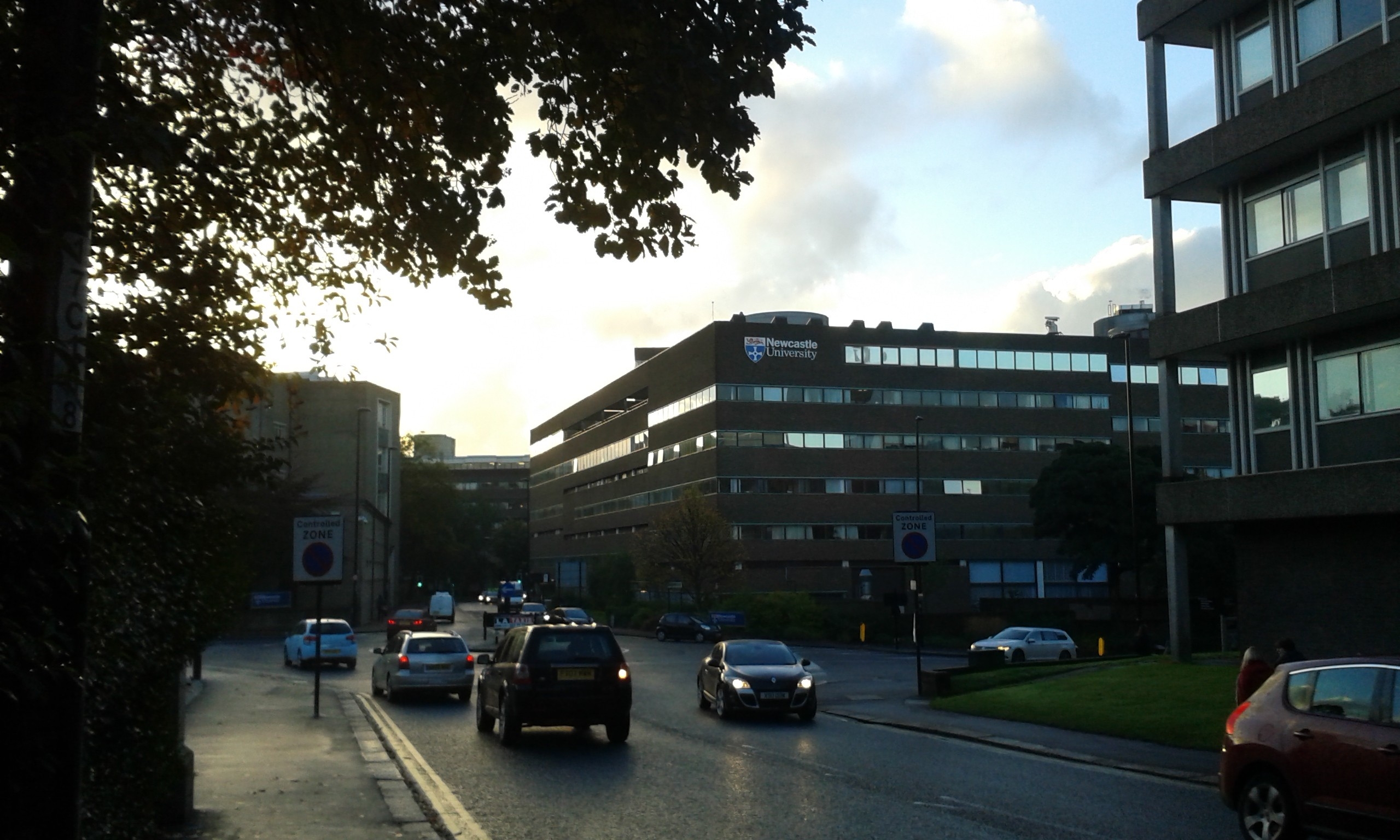The University research at the University of Newcastle is strongly focused on sustainable future. Domi, Tellus Think Tank 2015
Not only does the United Kingdom and England, where I am this particular morning, live up to its reputation of being a rainy island but also I start my day with two pieces of lovely English toast and then get to take a double-decker-bus into the Hay Market City Centre of Newcastle together with my English cousin and neighbourhood friends. It all gives me the feeling that I am lucky to be able to try out the British way of life “for real” and not as a tourist this specific morning!
ABOUT TELLUS THINK TANK….read more here
Read Tellus Think Tanks introduction to Newcastle upon Tyne – city of sustainability!
The University of Newcastle upon Tyne
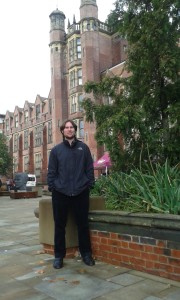
The morning commuter journey brings me to the University of Newcastle, established in 1834 and early recognised for its medical and surgery education. Starting out by providing lectures and surgery demonstrations to about 25 students it has grown and presently, annually, attracts 20 thousand students from over 100 countries.
Teaching, research and undergraduate degree programs are held in academic schools and research institutes spread across three faculties:
-the Faculty of Humanities and Social Sciences
-the Faculty of Medical Sciences
-the Faculty of Science, Agriculture and Engineering
Tellus Think Tank meets Brett Cherry, the Science Communications Manager at the University’s Institute for Sustainability. He greets me in the uniquely formed, modern looking steel frame of the Devonshire building in the University area and we soon sit down over a cup of English tea!
I learn that the Institute for Sustainability, within short, is moving to a greener pasture by the name “the Key”, now under development on the Science Central site (would you like to be notified when the next article in the Tellus Think Tank series on Newcastle upon Tyne is published, sign up for the weekly newsletter here.
What does the Institute for Sustainability do, and what is its message to the world?
-There is a common understanding within the University of Newcastle and the Institute for Sustainability that the current level of climate force is taking place because of the amount of greenhouse gases that are generated primarily from the burning of fossil fuels, which is throwing the planet of balance, says Brett Cherry.
-We do sustainability because we want to find that balance again, Brett Cherry continues.
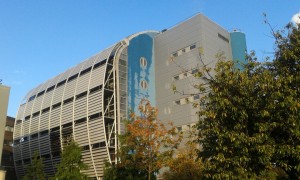
The Institute for Sustainability doesn’t hold educational sessions but funds researchers and works on driving the sustainability research forward within the University.
By gathering persons from multiple disciplines for research and projects of different kinds, the University solves problems with the purpose of creating a more sustainable future!
Brett Cherry smiles and likes the Institute for Sustainability to a science Pangaea, referring to where all the land-masses of the world once geographically lay together.
The institute works with “an holistic approach”, a necessity in the world of sustainability. Tellus Think Tank recently visited the sustainability center, CEMUS, at Swedish Uppsala University, also working with what they called an “interdisciplinary” approach (read article).
The Institute for Sustainability at the University of Newcastle is interested in both the science itself but also how the science can be used for practical solutions.
By taking a holistic approach, combining disciplines in research projects, ranging from engineering, social science, physical science, humanities etc, a project solution is not compartmented from a real world working solution.
So, what kind of research is the University of Newcastle up to?
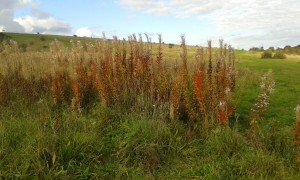
Brett Cherry gives me the “intel” in a fast pace.
- Urban Sustainable Farming, Anaerobic digestion and more
The University of Newcastle does Agricultural Urban Farming research and have two ecological research farms connect to it and they run research in areas such as:- Rural Energy, the making of energy on farming estates, winning methane gas from breaking down biodegradable material such as food scraps or animal and other organic wastes.’
- Comparisons between low-input, organic farming with traditional farming and investigating if pesticides are always needed when growing crops, how to avoid soil depletion and how to better care for farm animals.The research farms give students on all levels an understanding of how farming works in a go-see manor but also make interesting findings such as that the grass feed cows produce very good milk, high in omegas.Another finding is that when putting green waste back into the land it not only avoids soil depletion but restores soil and generates the soil’s water holding capacity which is important also to cities living down stream when looking at flood mitigation. This is a good example of a holistic view when mixing different disciplines in the world of academia!
- Ocean freight being one of Newcastle’s traditional strengths during its industrial era is still one important area of research at the University.

The Harbor of Newcastle upon Tyne. Photo: AnnVixen Researchers work with reduction of transport time, leaner and cleaner power sources, the cleaning the hull of ships with help of energy-saving underwater cleaning robots and designing ships to use less fuel.
Maybe it is in this area that “sustainable” is very clearly also linked to economic productivity. The connection being worded, brings both Brett Cherry and myself to nod in agreement.
- Flood mitigation & Water engineering is a threat towards communities in many urban areas on our globally heated planet (read the article Is Earth doing alright?)
The University is in this area highly interlaced in urban developments of larger Newcastle and work together with the city in avoiding future flooding disasters by planning city developments and infrastructure of the city in a flood mitigating way.
As an example Newcastle was hit hard by the “Toon flooding” in 2012, causing a lot of physical damage and transportation problems, some people even brought out their canoes for transport down their home streets. (See films on Youtube)
- Business models for sustainability. There is a need for business models to support sustainable ways of living and the faculty of Business Studies part in sustainability research often comes in forms of possible business models – one example could be how to incentivize people to consume electricity during low-usage hours or use alternative traffic routes to avoid congestion.
- Cyber Physical Systems is also known as the “internet-of-things” and is an area of growing importance according to Brett Cherry. He

IoT – Monitoring me. Photo: AnnVixen tells me that without them a smart sustainable future would be hard to achieve. The academic description isn’t that easy to grasp, but the examples are:
- Smart buildings with automatic, monitored and optimise heating, humidity, security and energy consumption.
- Environmental and Transportation monitoring systems
- Industrial process control systems
- Smart utilities, that is smart energy grids and water and waste monitoring of trash in a city.
- Health & fitness systems, such as self-monitoring wearable’s such as Fitbit’s, Runkeeper’s and smart watches.
- Smart Grids & Energy Storage. At this point in time of Earth human life is emitting far more greenhouse gases into the atmosphere than the eco system of Earth can handle and hence we have “Global Warming” with extreme weather, drought, floods and storms. Learn more in the Tellus Think Tank article with sustainability expert Niclas Köhler.
A lot of the carbon dioxide is emitted from heating and electrical systems, a sustainability problem that needs to be tended to promptly.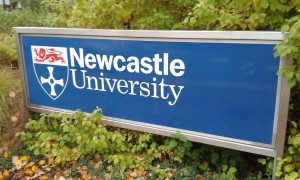
Photo: AnnVixen One way of emitting less is to not produce more power than needed and using renewable energy sources, such as wind turbines, solar cells etc. to the furthest extent.
The University of Newcastle have far developed research on Smart Grids and Electrical Storage and offers its own Smart Grid Lab to both researchers and enterprises for testing of their energy-storing devices.
Energy storage possibilities, says Brett Cherry, will be important in the future so that low-carbon energy can be stored for peak-demand periods in the energy grid.
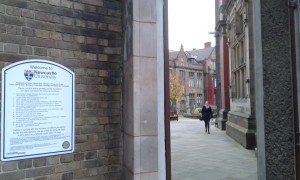
Tellus Think Tank feels highly inspired by the University of Newcastle’s large amount of research areas with focus on sustainability. This and the fact that the University is also involved with the urban planning of Newcastle makes us feel the need to return to Newcastle upon Tyne soon!
The Institute for Sustainability at the University of Newcastle’s view on sustainability is that “humans can act as stewards of sustainability rather than exploiting agents”, and those will be the last inspiring words that we will quote Brett Cherry on until next time!
Contact us: Tellus Think Tank is hoping to return to Newcastle during the year to come so if you may have any hints on interesting sites to visit or if you have any questions that would like to have answered – please let us know.
